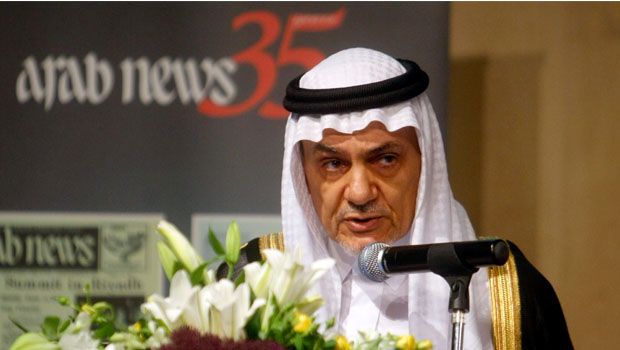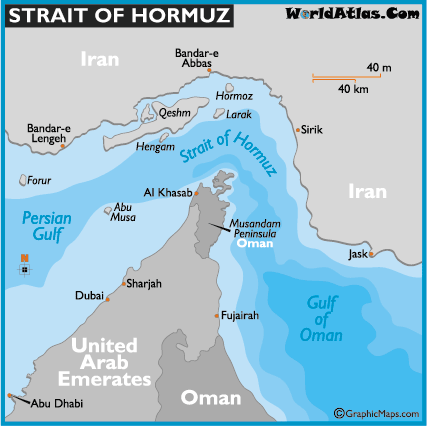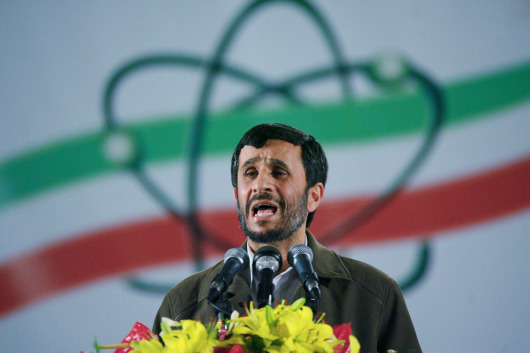“We cannot live in a situation where Iran has nuclear weapons and we don’t. It’s as simple as that,” a Saudi kingdom official told the British ‘Guardian’ newspaper. Saudi Arabia would then be forced to seek atomic weapons if Iran became nuclear-armed.”
The biggest American error was in ousting Saddam Hussein, who may have been a bloodthirsty tyrant, but also the ardent stabilizer of the secular middle east- holding Iranian threat to the Gulf states in check. The “Arab spring” could eventually happen, but the Islamic extremists would not have gained too much power with Saddam’s iron rule in Iraq still intact. The US has now withdrawn from Iraq, allowing for internal sectarian violence manipulated by Tehran and a developing all-out armed conflict between the Saudi Arabia/Sunni and Iran/Shia world. While the west is keeping Iran at bay through economic sanctions imposed on trade and oil export, Tehran threaten to close the Straits of Hurmoz, therefore escalating the crisis beyond control.

Prince Turki al-Faisal, a US-educated former Saudi intelligence chief and former Saudi envoy to the US, has yesterday issued a stern warning to Iran. According to him, the Iranian escalation will lead to “misadventure”, stressing the readiness of the Arab Gulf States to use all options available to defend their interests.
Misled by intentionally feeding disinformation to US intelligence by Iraqi dissidents, the Washington administration emerged on a needlessly wasteful campaign, not only causing internal havoc, with unforeseeable ethnic results, but eventually creating a highly dangerous situation in one of America’s most strategic regions, the Persian Gulf, resuscitating Iranian ambitions for Shi’ite hegemony on the Sunni Middle East. The scar that remains etched on American public opinion in the wake of the war, which was started on the basis of lies and deceit has also left some 5,000 coalition troops dead, with tens of thousands wounded.
An inevitable aftermath, resulting from America’s misguided foreign policy is the current domino effect on the Arab revolt, which further fosters Iran’s effrontery in the Gulf, any such brazen insolence the Tehran Mullah’s never dared to attempt before, in face of US overwhelming military supremacy in this highly strategic and sensitive region.
In fact, Iran had actually stopped its nuclear ambitions in its tracks, as soon as Operation Iraqi Freedom started, with its massive demonstration of “Shock and Awe” severely reverberating in Tehran. Almost ten years later, American troops have left Iraq to its unsecure future, virtually at mercy of Tehran Mullahs. Moreover, President Obama’s premature announcement of US withdrawal from Afghanistan has eliminated two massive threats, which haunted Iran’s Ayatollahs for decades and will now encourage them toward further audacious attempts in the Gulf.
Judging by the turbulence that engulfed the Middle East since January 2011, President Obama may have ‘opened the floodgates of hell’ in the Middle East. An inter Islamic Shi’ite-Sunni war, which has been in the offing for over 800 years, will most probably come next onto the scene, with Jewish Israel, although non-relevant in this inter-ethnic struggle, drawn unwillingly into an ultimate nuclear catastrophe.
Inevitably, sensing a war situation with Iran has already created high fever pitch in Israel. Receiving top priority in the political agenda, regarding a nuclear attack from Tehran existential is driving the demand for an increased defense budget to the limit of national capabilities. President Mahmoud Ahmadinejad’s repeated rhetoric, warning to eradicate Israel from the map has contributed to an already nervous public attitude, with memories of the holocaust still alive with many Israelis.
Unfortunately, as history teaches us, keeping a nation on its toes, in face of existential threat to survival, was and is common practice, manipulated by politicians under economic stress – it diverts public demands and averts from serious mishaps in leadership. Israel in 2012 is no exception in that case.
There is little doubt left, when considering Israel’s strategic situation, that another armed conflict, causing serious consequences, cannot be ruled out and the nation needs all its faculties to be prepared. But whatever the threat – it will not be existential, or endangering its very survival. A report, published early November by the Washington based Center for Strategic and International Studies (CSIS) stated: “Even if Iran will achieve its ambitious goal, it will be limited to relatively low yield, non-boosted fission weapons for some years into the future while Israel already has high yield boosted and thermonuclear weapons.” The report also highlights Iran’s vulnerability to a nuclear attack, despite the country’s large area: “The greater metropolitan area of Tehran is home to some 15 million people, which constitute 20% of Iran’s population”.
Moreover, senior defense and oriental experts offer quite a different approach to the reasons, which guide the Iranian nuclear program. Efraim Halevi, former Mossad chief said, “Iran is no threat to Israel’s existence. All Middle East nations, and first and foremost Iran know Israel cannot be destroyed”. Apart from its massive military superiority, Israel’s multi-layer missile defense system “Homa” enables it to successfully intercept and destroy any ballistic missile, including nuclear capable, potentially fired by Iran, says Arieh Herzog, who headed the Defense Ministry’s Missile Defense Agency.
Assessing Iran’s strategic ambitions, reveals that Tehran’s interests chiefly focus on exploiting Sunni-Shiite rivalries in the Arab world for political hegemony, in which the Jewish State is virtually no category at all. ‘Israel hatred’ is cleverly manipulated by the Tehran in gaining support in the Arab world. It serves them well in disguising the real objective – to implement their aspiration in restoring their ancient glory by returning to the days of the dominating Persian empire – in other words, establish a Shiite hegemony over the Sunnis in the Middle East. It is little known that while the Shia is only 15% of the entire Muslim world, in the Middle East they are reaching nearly 50%!
President Mahmoud Ahmadinejad, the master of illusions, promises that he has no intention of using nuclear power for anything but peaceful purposes. While he misleads the world, the Iranian nuclear potential turns into a loaded gun pointed at the Gulf Sunni Arab sheikhdoms, having near 45% of world oil reserves, but all extremely vulnerable to nuclear blackmailing, if not total dominance by a Shiite regime.
Iran is a major security concern of the Gulf States. “We have a shared interest in preventing Iran from becoming a nuclear power,” said Mustafa Alani, research director at the Gulf Research Centre in Dubai Sami Alfaraj, President of the Kuwaiti Center for Strategic Studies. “With a single atomic bomb in its arsenal, Iran would become an insurmountable regional power, a fact that could totally destabilize the security of our region,” he warned.
Inevitably this would not end with a nuclear armed Iran either. As it moves ahead with its nuclear ambitions other countries in the Gulf will be pushing forward with their own plans to go nuclear. Qatar, Bahrain, Oman, Kuwait, the United Arab Emirates (UAE) and Saudi Arabia, all oil rich nation, with huge excessive funds at disposal, have indicated substantial interest in developing nuclear programs. In the 1990s Saudi Arabia has also obtained CSS-2 ballistic missiles from China, capable of carrying nuclear warheads across the gulf. Riyadh has quietly discussed obtaining more modern missiles from China, armed with ‘dual key’ nuclear weapons from Pakistan, to deter a potential Iranian nuclear threat.
A future nuclear Middle East, at loggerheads between Shia and Sunni, could become the doomsday Armageddon prophesy. With this, the hopes of the “Arab Spring” would ultimately disintegrate into the Shiite-Sunni “nuclear Winter”. Whether this catastrophe can be averted will depend entirely on Washington’s firm determination to restore its resolve in maintaining “Pax Americana” in the Gulf and entire Middle East.

















